In the dynamic realm of e-commerce, terms like omnichannel and multichannel are often tossed around, but what do they truly entail? How do these strategies differ, and how does your choice of a sales strategy impact your fulfillment services? Can your fulfillment partner offer omnichannel fulfillment services? We’re here to guide you through the answers to these pressing questions! But before we dive in, let’s take a step back and absorb some foundational information.
Sales Channels vs. Marketing Channels
Most e-commerce ventures commence with a single sales channel, whether it’s a shoppable website or a physical store. As businesses grow, their marketing efforts extend beyond a singular channel, encompassing various methods to drive potential customers to their storefront. When a brick-and-mortar store adds a website, or an e-commerce startup lists products on platforms like Amazon, a multichannel sales strategy is adopted. Essentially, multichannel means providing customers with multiple locations or ways to purchase products.
Both types of e-commerce businesses may also employ a multichannel marketing strategy, using diverse methods such as email, social media, paid search, and advertising to direct traffic to their website. Responsive website design ensures accessibility on various devices, creating a seamless experience for customers.
In essence, a multichannel sales strategy implies that customers can engage with your brand through different channels, devices, and locations.
| Multiple Sales Channels | Multiple Marketing Channels |
| – Website | |
| – Physical store | – Text or push messaging |
| – Mobile app | – Pay-per-click advertising |
| – Social media stores | – Paid search |
| – Third-party marketplaces (Shopee, Lazada, Tiki, etc.) | – Retargeting ads |
| – Wholesale to third-party retailers | – Social media advertising |
| – Affiliate or Influencer advertising | |
| – Traditional media advertising | |
| – Direct mail | |
|
– Sales team outreach |
What is an Omnichannel Sales Strategy?
An omnichannel sales strategy is essentially a more integrated form of a multichannel strategy. It goes beyond providing multiple purchasing options; it involves the seamless integration of all channels and technologies to create a unified experience for customers, regardless of where they’re shopping or what device they’re using.
This approach relies on robust technologies to identify and track customers across channels. Data is collected, analyzed, and leveraged to predict shopping behavior, forecast demand, streamline the shopping experience, target marketing accurately, personalize ad messaging, and engage with customers effectively.
Examples of a Streamlined Shopping Experience:
- A customer receives a mobile push notification reminding them to check out, leading them to complete the purchase on their phone.
- A shopper in a retail store gets a text offering a discount on a product they are browsing.
- An order issue is swiftly resolved through direct messaging on social media.
- A return and exchange process is initiated seamlessly through live chat on a mobile app.
- A customer receives targeted follow-up emails and shipping notifications after making a purchase via a TikTok link.
In each case, technology integrations and robust customer data platforms ensure a cohesive journey for customers while providing several benefits for the e-commerce company.
- Marketing messages can be precisely targeted by channel and customer.
- Valuable customer data fosters loyalty and enables a personalized experience.
- Customer service representatives have instant access to order information for quick issue resolution.
Omnichannel Fulfillment Services
Embarking on an omnichannel sales strategy necessitates a close examination of omnichannel fulfillment. The fulfillment center serves as the nexus where tech integrations consolidate all customer orders. These orders must be prioritized, accurately picked, packed, and shipped on time to the correct customer. Real-time inventory tracking is essential to prevent stockouts and backorders. To optimize shipping costs, distributing inventory across warehouses nationwide becomes a viable option. Conventional warehouse management systems may fall short in meeting these requirements.
Enter SwiftHub, a tech-forward third-party logistics (3PL) partner, where omnichannel fulfillment isn’t the exception but the norm. Our cutting-edge fulfillment software seamlessly integrates with over 10 e-commerce shopping carts, marketplaces, and solution providers, offering plug-and-play functionality. It automatically synchronizes orders from all sales channels, including e-commerce, retail, and wholesale operations, into a user-friendly order management system. Clients and their customer service teams can swiftly assess the status of any order, receiving immediate notifications of carrier delays. Additional services like FBA prep and Seller Fulfilled Prime fulfillment further enhance the fulfillment experience.
Mastering Omnichannel Fulfillment with SwiftHub
In an omnichannel landscape, inventory management with cross-channel visibility becomes paramount for forecasting and managing inventory levels across the business. SwiftHub’s inventory management system provides real-time insights into the location, status, and selling trends of goods. Ensuring orders are routed to the most cost-effective shipping location, whether it be for two-day, standard, or economy shipping.
Can your fulfillment center deliver all this? It’s better to ascertain now than later when it might be too late. Let SwiftHub manage your omnichannel fulfillment services, helping you construct a fully integrated tech stack that aligns with your evolving needs.
Contact us today to elevate your fulfillment experience!

 Tiếng Việt
Tiếng Việt

